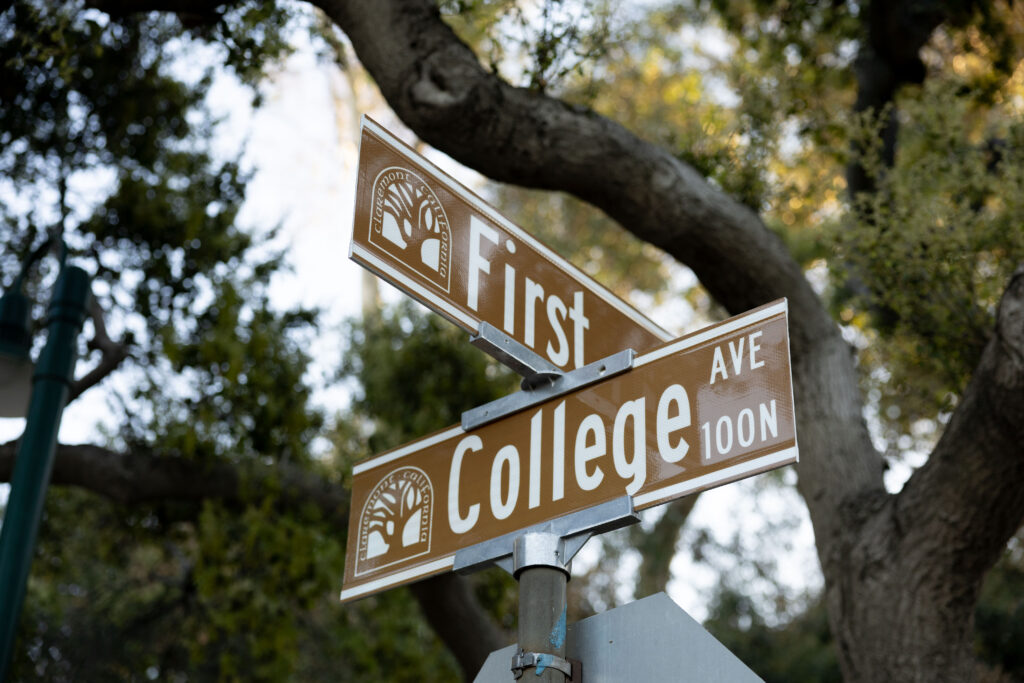Ellen Wang ’25 and Alyssa Wend ’24
Editors-in-Chief
The Claremont Police detained a Scripps professor and seized their property without a warrant near campus on Nov. 27, 2023. The professor, henceforth referred to as Jaden Doe to remain anonymous, was pulled over on S. College Ave and 1st Street on their way to work.
Police officers asked them to throw their keys and phone out of the window, to which Doe initially refused and asked for an explanation. “At one point, I looked behind me, and they all had their guns pointed at me,” Doe said.
After getting out of their car, Doe said they were handcuffed and held in the back of a police car for about an hour while their car was towed.
“I was trying to record [the police] and also ask them, ‘What’s going on? Do you have a warrant?’” Doe said. “They were like, ‘We don’t really know, but your license plate was put into our system.’”
The police refused to return their belongings and left with their phone, computer, wallet, and keys. After being released, Doe walked the rest of the way to campus. Once on campus, they faced the challenge of teaching classes without their belongings.
“I couldn’t get into anything because I didn’t have my phone or my computer,” Doe said. Finally, a staff member assisted Doe in contacting their students and canceling class for the day.
Doe had been attending protests in solidarity with Palestine in Los Angeles during the weeks prior. Following the events in Claremont, Doe stopped attending protests for fear of administrative and further legal retaliation. “I felt like a liability … on my phone are the numbers of everyone I organized with,” Doe said.
Doe contacted the American Civil Liberties Union (ACLU), which confirmed the detainment was illegal. Later, the ACLU informed Doe that they did not have the capacity to take on the case.
“I was eventually able to talk to people and connect with some really amazing lawyers because I figured out that [the incident] was connected to Palestine Solidarity protests,” they said.
A month after the stop, the police allowed Doe to retrieve their personal belongings from the Beverly Hills Police Department, other than their phone. The police still have custody of Doe’s phone.
Doe reached out anonymously to Claremont Faculty for Justice in Palestine about their experience. However, they hesitated to speak out more after seeing how the 5C administrations responded to campus protests.
“I didn’t want to tell [the department] because I’m like, they’ll just fire me … And the [arrest of] the other professor had just happened too,” Doe said. “It’s just the tough thing about being a contingent faculty member, you’re always trying to figure out how to keep your job or not lose your job. And I don’t know if there’s anything more that could have been done unless the entire institution of academia was different.”
Doe recently chose to inform the head of their department. “[They’ve] been really supportive,” Doe said.
In their own experience in graduate school, Doe was disappointed in how faculty avoided difficult conversations. “Part of why I am an educator is because I value an opportunity to talk about really difficult and politicized stuff with students,” Doe said. “I wish I had had more teachers and mentors that were like, ‘Hey, this thing is going on right now. It’s political and we are going to talk about it because it’s important.’”
Having difficult conversations is not new to Doe, and this particular topic is especially personal to them. “It’s been a big part of my life differentiating myself and trying to understand myself as an anti-Zionist Jew,” Doe said.
Doe also recognized the role their privilege played in the interaction in their reflection.
“When I finally got out of the car … All of their body language changed. They still had their guns on me, but I could tell that they were kind of laughing,” Doe said. “There’s other gendered stuff going on, but I’m privileged to live in this body when something like that happens because it could have gone down really differently.”
Although their phone is still in custody, Doe is grateful that they are currently not facing other legal repercussions.
“If that’s all that happens, I feel like that would be the best-case scenario,” Doe said.
Despite this experience, Doe recognized the importance of continuing to take action.
“There’s certain things I regret in terms of safety and my phone, but there’s no protest or anything I did that I regret because I think it’s really important to me to be engaged in doing something,” Doe said. “It’s the tiniest drop in the ocean, but I’m just so consumed by anger and sadness at seeing hundreds of people being killed every day … If I have to go through that again, if it maybe helps one child access one piece of food, it’s worth it.”
Photo Courtesy of Ellen Hu ’24



